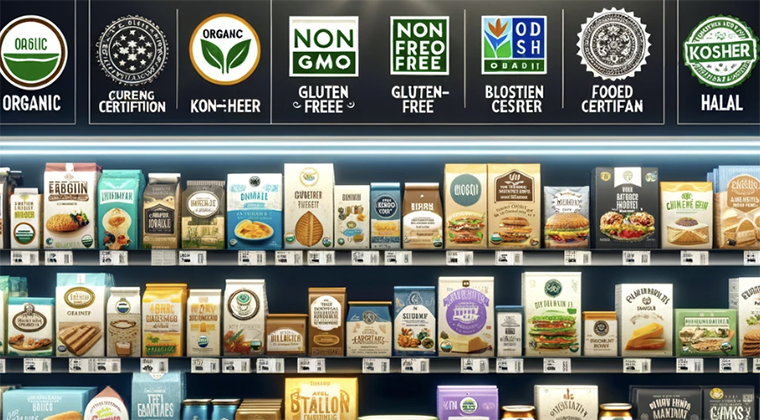Food certification in the United States is undergoing a significant transformation, reflecting global trends and consumer demands. In 2023, the market for food certification is estimated to secure a valuation of $10,313 million, with a forecast to register a Compound Annual Growth Rate (CAGR) of 11% through 2033. These statistics underscore a growing consumer awareness and demand for certified attributes like organic, animal welfare, and clean-label foods. As the food industry adapts to these changes, various certification types, including organic, kosher, and halal, are gaining traction.
Food Certifications: Changes Afoot
The shift in food certifications in the USA is largely driven by changing consumer preferences and an increased emphasis on food safety and quality. With the globalization of the food industry, ensuring food certification has become more essential than ever. Consumers are demanding greater transparency and quality assurance, leading to the adoption of more stringent regulations and standards. This evolution is not only driven by consumer demand but also by the need to improve food safety systems within and across countries.
Organic Certification: Standards and Impact
Organic certification has seen significant changes, particularly in response to the rising demand for organic food and natural products. This certification ensures that products meet specific organic standards and requirements, covering everything from the absence of synthetic pesticides to the use of sustainable farming practices. The impact of organic certification is profound, influencing both producers, who must adhere to strict guidelines, and consumers, who seek assurance of product quality and environmental stewardship.
Halal Certification: Gaining Prominence in the USA
Halal certification, which denotes compliance with Islamic dietary laws, is gaining prominence in the USA. This growth is part of a global trend, with countries like India seeing a rise in demand for kosher and halal food certification due to increasing health awareness and dietary preferences. In the USA, the halal market is expanding, driven by a growing Muslim population and a general consumer interest in halal-certified products, perceived as wholesome and hygienic.
Non-GMO and Gluten-Free Certifications
Non-GMO and Gluten-Free certifications have witnessed a surge in popularity. These certifications cater to specific consumer needs and health concerns. Non-GMO certification assures consumers that products do not contain genetically modified organisms, while Gluten-Free certification is crucial for those with gluten intolerance or celiac disease. These labels have become significant deciding factors for many consumers, influencing their purchase decisions.
The Role of Technology in Food Certification
Technological advancements are significantly impacting food certifications. Tools like blockchain are enhancing the tracking and transparency of food products from farm to table. This technology ensures the integrity of the certification process, providing consumers with verifiable and tamper-proof records of a product’s journey and compliance with certification standards.
Challenges and Future Outlook
The evolving food certification landscape faces challenges, including maintaining the integrity of certifications amid rapid market growth and varying global standards. Looking forward, the industry anticipates further growth and diversification of certifications, reflecting an ongoing commitment to food safety, quality, and consumer preferences.
In The End
As the food certification market continues to grow and adapt in the USA, it reflects a broader global trend towards food safety, quality, and transparency. From organic to halal certification, these evolving standards are reshaping the food industry, driven by technological advancements and changing consumer demands. The future of food certification looks promising, with a focus on quality, sustainability, and meeting the diverse needs of consumers.







